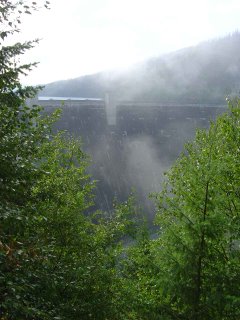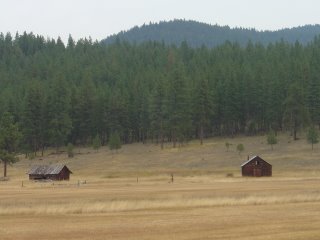Sunday, February 18, 2007
The Flathead Valley
 The one point of interest in Hungry Horse that I can find is the Hungry Horse Dam, and I drive a couple of miles steeply uphill to find it. The times being what they are, this is as close as I can get to it, and the clouds don't help either. There's boating and fishing and camping around the lake, but I do none of these, just wind back down through the pine forest and canyon, make a left on the highway, and head toward Kalispell and Missoula.
The one point of interest in Hungry Horse that I can find is the Hungry Horse Dam, and I drive a couple of miles steeply uphill to find it. The times being what they are, this is as close as I can get to it, and the clouds don't help either. There's boating and fishing and camping around the lake, but I do none of these, just wind back down through the pine forest and canyon, make a left on the highway, and head toward Kalispell and Missoula. The road runs along the Flathead River through a gap called Bad Rock Canyon, where there's another one of those point of interest signs written like a goofy parody of Zane Grey. It explains, in a tone that undermines its credibility, that the canyon's name comes from the spot where the Blackfeet held off the Flatheads in a series of raids and reprisals. (Judge for yourself here. Lord, the things you can find on the web.)
The road runs along the Flathead River through a gap called Bad Rock Canyon, where there's another one of those point of interest signs written like a goofy parody of Zane Grey. It explains, in a tone that undermines its credibility, that the canyon's name comes from the spot where the Blackfeet held off the Flatheads in a series of raids and reprisals. (Judge for yourself here. Lord, the things you can find on the web.) Anyway, it's a pretty road for a few miles, but abruptly we roll out of the mountains onto a flat plain and into Kalispell, which is the major commercial center in these parts, and save for a couple of blocks of old-fashioned downtown is one of the least appealing places I've seen to date: One big box store after another, lining the highway south of town, punctuated by signs advertising new housing developments where you can live the American dream in the glorious, wide open spaces of the wild west. Or something. It reminds me of how a professor of mine at Kenyon once described the similar landscape of Mount Vernon: "If it was a mindless development process, as it sometimes appears to be, that's really sad. If it was not a mindless process, if some group decided that this is their vision ... that's even sadder. I'd rather believe in chaos than in that."
Anyway, it's a pretty road for a few miles, but abruptly we roll out of the mountains onto a flat plain and into Kalispell, which is the major commercial center in these parts, and save for a couple of blocks of old-fashioned downtown is one of the least appealing places I've seen to date: One big box store after another, lining the highway south of town, punctuated by signs advertising new housing developments where you can live the American dream in the glorious, wide open spaces of the wild west. Or something. It reminds me of how a professor of mine at Kenyon once described the similar landscape of Mount Vernon: "If it was a mindless development process, as it sometimes appears to be, that's really sad. If it was not a mindless process, if some group decided that this is their vision ... that's even sadder. I'd rather believe in chaos than in that."So it's a relief when Kalispell peters out into fenced-in prairie at the northern end of Flathead Lake. At the advice of Big John from the Two Sisters cafe, I take the longer route around the east side of the lake to avoid construction on the main road. The route sends me through thirty or forty miles of piney woods and little towns geared to fishermen and boaters and horse types. It's a pretty day for driving and a straight, flat road most of the way, with cows and horses about and mountains on either side.
 In the early afternoon I switch off the iPod and turn on the radio to catch the Dodgers' game. I've listened to a lot of baseball on this trip, probably too much; I haven't made any progress through the ten gigabytes of songs I'm carrying with me. On just about any given night I can dial into an east coast game and a west coast game, and on a weekend three. The Sunday night game on ESPN radio has been my calendar, and has probably led me to log a lot more miles on Sunday evenings as I realize another week has been whittled away in some place that's not my destination.
In the early afternoon I switch off the iPod and turn on the radio to catch the Dodgers' game. I've listened to a lot of baseball on this trip, probably too much; I haven't made any progress through the ten gigabytes of songs I'm carrying with me. On just about any given night I can dial into an east coast game and a west coast game, and on a weekend three. The Sunday night game on ESPN radio has been my calendar, and has probably led me to log a lot more miles on Sunday evenings as I realize another week has been whittled away in some place that's not my destination.A good baseball announcer can be the best of company on a back road. The problem is, the number of good baseball announcers seems to be on the wane. I like the pair on ESPN, and their work benefits from the lack of interest in a home team. And in Cleveland, Tom Hamilton yells too much but is otherwise genial and fair; and he has a fine partner Mike Hegan, an ex-first baseman who grew up in Cleveland watching his dad play there but had the sense to play for better teams when he grew up. So I listen to them a lot, of course, but the team is going nowhere this year, and driving around this part of the country has made me feel significantly more embarrassed and disappointed in their choice of "mascot."
Around the dial, though, too often the choice tends to be between shills on the one hand, and bores on the other. Or, in the case of the Tigers, both at the same time, and this is especially sad to someone who used to dial up WJR on a summer night just to hear Ernie Harwell say of a hitter, "He stood there like a house by the side of the road," even if it was usually my guy doing the standing.
But in the summer of 2006, there's still Vin Scully. He was in the background of my evenings for most of the three summers I spent in Los Angeles, and almost made a Dodgers fan out of me. And now in the age of satellite radio, I dial him up just about every chance I get, because someday the guy who was on the radio during Brooklyn's World Series win is going to decide he doesn't need to spend half the year going to ballgames anymore, and that'll be that.
 It's a quirk of the schedule, a noon game, that puts Vin in the car with me headed down highway 35 and US 93, past a sign for a ghost town that I elect to skip and a large Hereford advertising a mini-mart and wildlife gallery. I have to stop for gas, and check out the gallery while I'm inside paying and purchasing snacks. From what I can tell, it consists of reproductions on black velvet. The Hereford is considerably more impressive.
It's a quirk of the schedule, a noon game, that puts Vin in the car with me headed down highway 35 and US 93, past a sign for a ghost town that I elect to skip and a large Hereford advertising a mini-mart and wildlife gallery. I have to stop for gas, and check out the gallery while I'm inside paying and purchasing snacks. From what I can tell, it consists of reproductions on black velvet. The Hereford is considerably more impressive.Back in the Element with Vin. There are certain actors - Morgan Freeman is one; William B. Davis of The X-Files is another - whom I especially like because of the way they seem to sing their lines. It doesn't matter whether anyone talks that way; it's beautiful and interesting and, at its best, truer than realism. So Vin Scully. He rarely yells, not even with the Dodgers on a hot streak that up to today has them winning 17 of their last 18 games: just lifts his pitch a couple of tones, elongates his words, and sings the delight of 48,000 fans to you in a way that trusts you'll get it without him hollering at you what you're supposed to feel.
He's like Freeman and Davis, but more, because he's making it up as he goes along, reading the score in front of him and then improvising from there. He stitches pet phrases into the fabric of the action; tells an old story from the days at Ebbets Field and in the middle of it lands hard on the word "whacked!" like it's his index finger dropping on A above middle C, as Jeff Kent laces a double down the line. He's one of the great jazzmen of the last half-century, and I mean that literally.
Things get a bit confusing as I get close to Missoula, and the next thing I know I'm on I-90 for the last few miles into the city. I exit downtown and head toward the University cross the Clark Fork in hopes of finding Dave.
Comments:
<< Home
Baseball on the radio--the high-tech, new century, XM era takes you back to childhood (and beyond) to the days before there was TV and baseball seemed to be a game invented for the radio, one where Vin Scully and his forebears painted pictures with words to pass the long summer evenings and take millions of fans with them vicariously to the ballpark.
Thanks for the reminder.
Post a Comment
Thanks for the reminder.
<< Home
